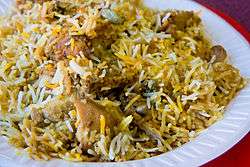Hyderabadi biryani
|
Hyderabadi Biryani | |
| Place of origin | India |
|---|---|
| Region or state | Hyderabad, Telangana |
| Main ingredients | Basmati rice, meat (or mutton), spices |
|
| |
Hyderabadi biryani is a form of biryani, from Hyderabad, India.[1] It is prepared in the form of kachay gosht ki biryani and dum ki biryani.
 |
| This article is part of the series |
| Indian cuisine |
|---|
|
Regional cuisines
|
|
Ingredients, types of food |
|
See also
|
|


Ingredients
The ingredients are basmati rice, goat or chicken meat, yogurt, onions, spices, lemon, saffron. coriander leaves and fried onions are used as garnish. The preferred meat is goat, but chicken, or other meats are used in some variations.[1]
History
Biryani is considered to be a dish of Indian origin, more prominently considered to be dish of Nizam (Ruler of the state of Deccan). South India has more varieties of biryani than any other part of the subcontinent. Also, rice is more a staple food in South India than in the rest of India.[2] Hyderabadi biryani originated as a blend of Mughlai and Iranian cuisine in the kitchens of the Nizam, rulers of the historic Hyderabad State.[3][4] Hyderabadi Biryani is also a staple part of Pakistani Cuisine due to its exotic flavor and aromatic taste.
Types
Hyderabadi Biryani is of two types: the Kachchi (raw) Biryani, and the Pakki (cooked) Biryani.[5]
Kachche gosht ki biryani
The Kachchi biryani is prepared with meat marinated with spices overnight and then soaked in yogurt before cooking. The gosht (meat) is sandwiched between layers of fragrant long-grained basmati rice,[6] and cooked on dum (steaming over coals), after sealing the handi (vessel) with dough. This is a challenging process as it requires meticulous attention to time and temperature to avoid over- or under-cooking the meat.
Pakki biryani
In a Pakki biryani, the meat is marinated for a shorter time, and cooked before being layered with the rice and cooked in a dough-sealed vessel. In Pakki Aqni (with cooked gravy), the ingredients are cooked before baking.
The gravy is redolent of mace, ittar and kewra. Saffron and cardamom are also used.
There is also a vegetarian version of the biryani, which is made using vegetables such as carrots, peas, cauliflower and potato and cashews.
Accompaniments
A biryani is usually served with Dahi chutney (yogurt, mint, and onion) and Mirchi ka salan[3] - a green chili curry. Baghara baingan (roasted Eggplant) is a common side dish. The salad includes onion, carrot, cucumber, and lemon wedges.
See also
References
- 1 2 Colleen Taylor Sen (2004). Food culture in India. Greenwood Publication. p. 115. ISBN 0-313-32487-5. Retrieved 12 October 2011.
- ↑ "Biryani is an Indian invention". Virsanghvi.com.
- 1 2 "Telangana / Hyderabad News : Legendary biryani now turns `single'". The Hindu. 2005-08-18. Retrieved 2011-02-18.
- ↑ "Of biryani, history and entrepreneurship - Rediff.com Business". In.rediff.com. 2004-04-09. Retrieved 2011-02-18.
- ↑ "Metro Plus Chennai / Eating Out : Back to Biryani". The Hindu. 2005-06-13. Retrieved 2011-02-18.
- ↑ "Timesonline.co.uk". Retrieved September 30, 2009.
Further reading
- A Princely Legacy, Hyderabadi Cuisine By Pratibha Karan ISBN 81-7223-318-3 ISBN 978-81-7223-318-1
- Elegant East Indian and Hyderabadi Cuisine By Asema Moosavi, Moosavi, Asema ISBN 0-9699523-0-9
- The Hindu: Hyderabadi Biryani popularity and its variants
External links
-
 Media related to Hyderabadi Biryani at Wikimedia Commons
Media related to Hyderabadi Biryani at Wikimedia Commons



